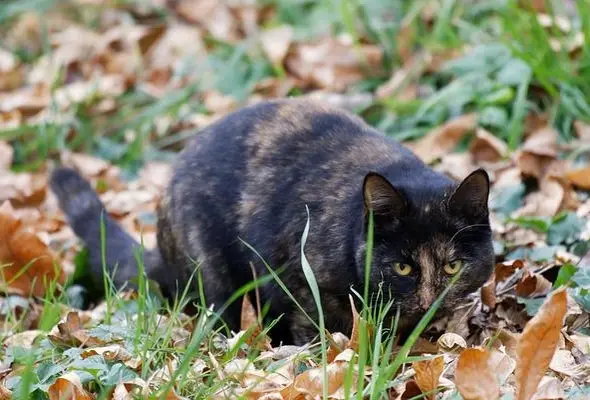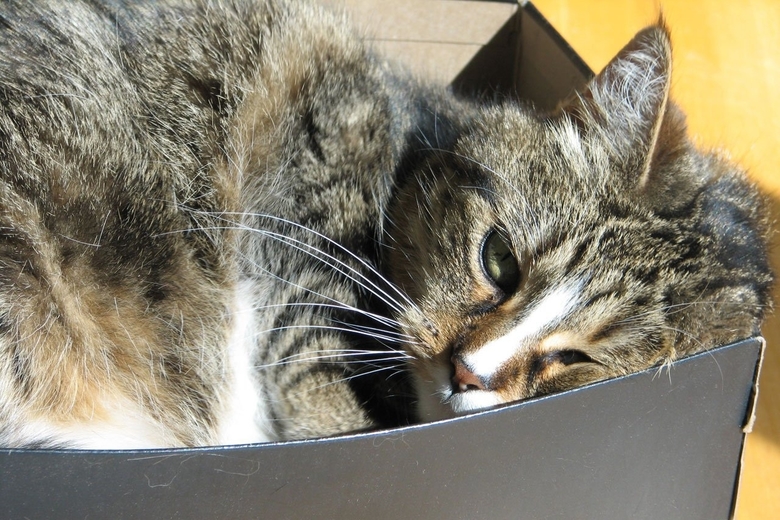Cats are complex creatures with interesting personalities and instincts that are extremely unique to their species. They exhibit a wide range of confusing behavior and we started to ask ourselves; why do cats lay on uncomfortable things?
We researched the wonderful world of feline instinctual behaviors and found the answer to the above question, as well as other interesting information about these fascinating felines.
Why Do Cats Lay on Uncomfortable Things?
Cats like to lay on uncomfortable things because they are instinctually territorial over their homes and like to leave their scent anywhere they can to ward off any competition from other cats.
Cats are interesting little creatures that normally have very independent personalities. They like being in charge and are known to boss their owners around from time to time.
While they can be serious at times, cats actually have really enjoyable personalities and if socialized properly they can enjoy spending time with a wide variety of both humans and animals. Cats are highly intelligent, and can even be trained to perform tricks and commands.
Why Are Cats Territorial?
In the wild, cats have to stay on guard at all times to watch for any possible threats to their safety or territory, and if they have kittens this instinct will become even stronger.

Cats are master escape artists and can be really threatening at times with their sharp teeth and claws that are there to help defend against any predators. They also had to hunt for their own prey and typically will hunt birds and small rodents.
Cats also employ their claws to hunt for prey and escape any predators. They are able to climb trees when they need a quick escape and are extremely fast while running. Cats are truly interesting animals with very quick reflexes.
If your cat is an indoor cat, they still have these inherited instincts! If you notice your cat ever stalking and pouncing on their toys, this is a perfect example of how they still have instincts even when they do not live in the wild.
We recommend feeding into this instinct with mental stimulation and high-stakes playtime.
Are Cats Territorial Over Their Owners?
Cats can become territorial over their owners, but this is not always a good thing. Cats can be more territorial than dogs and often take offense to multiple things that they feel are intruding on their space.

If a cat becomes territorial of their owners, this can cause issues within the home and aggression issues towards any housemates that they reside with.
We recommend spending equal amounts of play time separately with each cat in the household to avoid any unwanted behavioral issues arising in your feline friends. If your cat has not been properly socialized as a kitten, the risk of territorial aggression with humans and other pets is high.
If your cat begins exhibiting concerning behavioral issues, we recommend reaching out to a licensed veterinarian or professional cat behaviorist and trainer for help in ensuring these behaviors do not continue to get worse.
Establishing a schedule for dedicated play and training time is a great way to ensure your cats do not begin lashing out aggressively because of pent-up energy.
Remember, cats are highly intelligent creatures who enjoy exploring, so appealing to these traits with fun toys and games is a great way to ensure that you are meeting your cat’s mental and physical exercise needs daily.
What Other Behaviors Do Territorial Cats Display?
Cats exhibit a large variety of territorial behaviors, both aggressive and non-aggressive. Remember, cats are largely territorial and if not socialized properly as a kitten can begin to form serious behavioral issues and aggression, which no owner wants to have to deal with.
Your cat may have territorial aggression if they hiss, slap, or bite guests and housemates when they feel like their territory is at risk. Cats may also scratch out of aggression, and because of their long claws, they can cause serious damage to humans and animals.
Cats also have non-aggressive territorial behaviors that they will display fairly often. A cat will lay on things that they want to belong to them, hence the times you’ve caught your cat relaxing on an object that is not in the very least comfortable.
A cat will also rub their heads and chins on objects that they would like to leave their scent on, this can include their owners, furniture, toys, clothing items, and even other housemates.
If you have an unfixed male cat, he may begin spraying (which is not a pleasant smell whatsoever) around the outside and inside of your home to ward off any intruders. Not to worry though, as you can get your male cat neutered at 6 months of age which will stop this behavior.
Do Cats Respect Other Cats Territory?
Some cats may be more inclined to respect others’ territory, but others may disregard it completely. Cats will occasionally tolerate sharing their territory with others, but this is on a case-by-case basis.
If you bring a new kitten into a home where one cat has already established that the house is its territory, you want to be as gentle and slow with the introductory process as possible.
You should start this by keeping both cats separated at all times, feeding them together but with a barrier separating them. As time passes, you can decrease the barrier to allow more visibility.
With feral cats, territorial disputes are typically more aggressive. An unfixed male will fight other males over territory as well as any females that are near and in heat.
A feral cat may even begin to encroach on an indoor cat’s territory, and this can trigger undesirable behavior in your companion. We recommend spaying and neutering all housecats to avoid any mental or physical health issues.
Conclusion
We researched various questions that cat owners may have about territorial instincts, as well as the question; why do cats lay on uncomfortable things? We hope you found this article informative and helpful, and hope that you were able to learn more about the fabulous world of felines!

